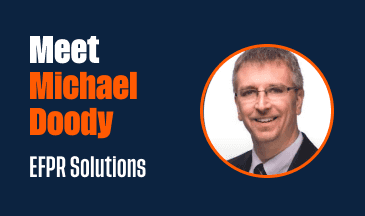How did you get into the accounting industry?
Doody: I’ve been in public accounting since the mid to late 90s, and I’ve been with the same firm since leaving college. I started on the audit side of things, focused on auditing clients, and then shifted into audited financial statements and tax work. When I first started, we were a smaller firm, so everyone did a little bit of everything.
I began learning a lot about how accounting systems work, and that morphed into an overall advisory role with clients, focusing more on working with tax planning and financial statements. Now focusing on reading their financial statements with them, talking to their bankers, and understanding how to help them understand their financials a little bit better than they did.
About five or six years ago, our firm decided to start a client accounting services practice, which is essentially outsourced bookkeeping and accounting services. We’ve seen a lot of growth over the last five years. We brought in a couple of resources to create a separate team from our audit and tax team to start the practice to avoid getting bogged down with tax deadlines.
The first thing that helped us springboard our growth was having a separate team dedicated to this type of service. The second thing that helped us was looking at and embracing various technology. Technology allowed us to get three things out the door in a week instead of one thing, and all of a sudden, we can take on those extra clients.
We made the strategic decision to support as few accounting platforms as possible and use those for all of our clients.
How do you get clients happy and engaged with new software?
Doody: Some clients are easier than others – we try our best not to make it an option. Without telling them that it’s not an option, we say this is our process, and this is our system. We want you to be just like all of our other clients and be part of that system so that you get the most out of it.
Otherwise, when we’re scoping it out, we let them know that when you come on with us, here’s what platform we want you to be on if you’re not already on them, and here are the other tools that we’re going to sign you up for. Those tools do this, and we will provide you training,
For the most part, they primarily respond with – Oh, that sounds cool. Most wouldn’t have the time to learn about those things, so we teach them to save them time and money.
Most of the platforms that we use provide a really good amount of training for us and deliverables that we can give clients to interface with the support needed. It hasn’t been too difficult. We’ve had a little bit of pushback from a couple of clients, but once they’ve used it for a bit of time, it’s become a nonissue.
What does efficiency allow your firm to accomplish?
Doody: When we first started the group, we were in the weeds most of the time dealing with transactional level stuff. Making sure that the activity going through the books was true, accurate, and timely, and it was in there correctly. As these tools start to become more of a default, things take less time. We’re still doing that work, but now we’ve been able to morph several of our clients into larger relationships.
Before, we might have reconciled their accounts monthly. Some of those clients have gotten to a place where now it’s “No, we’re not going to do anything related to cash or numbers until we talk to you guys.” And “we want more of your advice and counsel because we know the numbers are correct, and the fact that they can get numbers more timely, and pull those financials from the system on day five, instead of day 25 of the next month.” Now they’re looking at their data quicker, and they’re able to say, “we might have a problem, or we might have a great opportunity.”
We’ve got several clients now where we provide more CFO-level services. We have people doing all the detailed work payables, payroll, journal entries, and cash reconciliations. Now we have somebody as well, looking at and saying, let’s meet with the management team monthly, let’s go through the financials and talk through it, maybe do some cash flow forecasting with those clients. So they understand what’s coming up in the next 30 days, and it becomes less of a historical discussion to more of a current discussion with some forward-looking bend to it.
Our goal would be to have most of our time being forward-looking because that’s what clients want. Some clients just need certain things, and we provide that. But the clients that get what we’re trying to do, those are the ones that say I want more of the time. They don’t have time to be doing all this stuff, and they’re trying to run the business; they just need to know that this stuff’s taken care of.
That’s where we can add a lot of value. So it has allowed us to morph our offering to include some of those higher-end advisory services because it takes us less time to do the work.
To discover more insights from Michael, view his entire video interview here.
